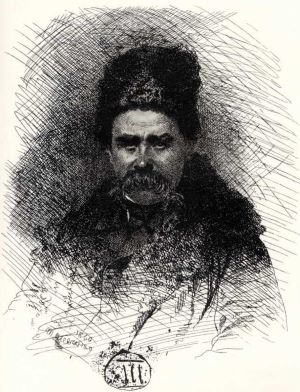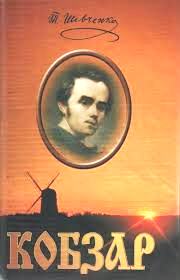|
Taras Shevchenko
TO THE DEAD,
THE LIVING AND THE UNBORN
COUNTRYMEN OF MINE
IN THE UKRAINE AND OUTSIDE THE UKRAINE
MY FRIENDLY MESSAGE
Translated by Irina Zheleznova.
"If a man say, I love God, and
hateth his brother, he is a liar!"
(The First Epistle General оf John,
Chapter 4, Verse 20)
God's day passes: now 'tis morning,
Now 'tis dusk, now even.
Men and beasts and all things living
Sleep.... Alone I'm driven
Day and night, like one by Heaven
Cursed and damned, to weep at
This great world's most densely crowded,
At its many-peopled
Crossroads.... No one sees or hears me;
Deaf to feeling, blindly
Trade they do in Truth and Honour,
Irons change for irons.
God they mock, and yokes they fit on
Human necks and shoulders.
Grief they plant, and seeds of evil
Sow.... The crops — behold them! —
Well deserved are they by tillers
Such as these.... But cover
Not your ears, and list, you ninnies,
To my counsel. Love her,
Love your land, this quiet Eden,
This great ruin; kindly
Gaze on sweet Ukraine, your mother,
Burst the chains that bind you
And be friends to one another,
Friends and brothers!... Vainly
Seek you do, I vow, in Heaven
And in strange and alien
Lands the many things of wonder
That you crave. Pray, heed me:
In your house, your own, you'll find them —
Truth and strength and freedom.
There's only one Ukraine, and only
One Dnieper in the world — yet you
Go off to foreign parts and roam them
In search of what is good and true,
In search of freedom, holy freedom,
And holy brotherhood.... Hurrah!
Found, found at last, and borne in greedy
Delight from alien shores and far
To the Ukraine — words.... Yes, big-sounding,
High-flowing words, naught else. If God
Created you, you shout, 'twas not
To make you worship lies!... Confound it,
You are unchanged — you never cease
To bow, and scrape, and cringe, and fleece
Your brothers, growers of grain, and lightly
Dance off to foreign parts where you
Feel very much at home quite rightly,
And there bask in the Sun of Truth.
If but our misery you could
Take with you, and the treasures stolen
By your dear forebears, then, I vow,
The Dnieper and its ring of holy
Hills would be orphaned here and now!
If only you left us and no more came back here,
If only you croaked where it was you were reared! —
No mother would weep and no child sob, forsaken,
And ne'er your invective of God would they hear.
This earth, free of you, would stay clean
and unsullied,
This steppeland, unfettered, this air,
sweet and pure,
And men would not know or dyspise you for your
Contemptible ways born of malice and folly.
Come, bethink yourselves, be human,
Or the chained and fettered
With the lot of you, you monsters,
Their accounts will settle!
They will break their chains, and judgement
Pass on you. The Dnieper
And the hills will roar, rebellious!...
Ever wider, deeper
Will the streams of blood, your children's
Blood, become. The stormy
Sea they'll reach, a hundred crimson
Rivers.... None, I warn you,
None will help you, none defend you,
Son will turn on mother,
And in bitter hate and fury,
Brother slaughter brother.
Know: your sons will damn and curse you,
Smoke will dim the heavens.
Wash the filth off! Do not sully
God's clean image. Never
Tell your children they were born to
Lord it over others.
Deep into their souls, their very
Souls their artless brother
Peer he will and know whose glossy
Skin you wear. The better
The untaught will get and simple
Of the wise and lettered!
If you applied yourselves to study,
You'd learn to think, but no — the skies
You climb, and mumble, dazed and muddled:
"We are not we, I am not I!
All have I seen, all know," and even:
"There is no hell, there is no Heaven,
There is no God, God is a lie,
There's only 'self' and too a bony
And long-faced German." "Good, but only
What is this 'self'?"
"Our friend, the German,
Knows, we don't." You journeyed
Far to get such wondrous schooling,
Such a wealth of learning!
"Mongols, all of you!" your German
Friend will utter boldly.
Barebacked offspring of a ruler —
Tamerlane the Golden.
"Slavs!" he'll cry. "You're Slavs!" Deny it
I will not — descendants
Mean and wretched of a noble
Race. You've put your hands on
Jan Kollar, Safarik, Hanka
And devour them, feeding
On their brains. The robes of true-blue
Slavophils, my greedy
Friends, you proudly don. The Slavic
Tongues you've learned and mastered,
All of them save yours: forgotten
It remains.... No matter!
You will learn it from your German
Friend and faithful preacher,
And our history, I doubt not,
He will likewise teach you.
How you'll strut about and swagger!...
There you are — his word is
Your command, you strut and swagger,
And our tongue you murder.
Why, it even leaves your famous
Teacher somewhat puzzled,
Let alone the common people....
And what noise! What dazzling,
Pompous words: "Power, force," and also
"Harmony" and "music."
And our history — "an epic,
All things noble fusing,
Of a free and mighty people!"
Rome and all its fearless
Brutuses and Cocleses —
What a farce! Our heroes
Greater are by far.... And freedom —
'Twas the Dnieper laved it,
'Twas these rolling steppes that fed it,
'Twas these hills that gave it
Shelter...." Nay, 'twas washed
by streams of
Blood and tears, and pillowed
On a mound of Cossack corpses,
On a lofty hill of
Ravaged corpses!... Read, I pray you,
Read our book of glory,
Let no word, no line escape you
Of that tragic story!
Do not miss a single tittle
Or a single comma.
Read, and ask yourselves: whose children
Are we? What's become of
Us that we should be in fetters?
Then the worth and merit
You will see of all your valiant
Brutuses, I swear it.
Slaves, Moscow's filth and dirt, the scum
Of Warsaw — that is what your lords are,
Your Hetmans! Aye, to you these words are
Addressed, Ukraine's proud offspring... Come,
Boast you that better than your fathers
You fit the yoke, friends? Do not boast!
For you are only birched and belted
And have your skin stripped off, at most,
While out of them the fat was melted.
That the Faith the Cossacks fought for
And in distant Trabzon
Boiled their famous dumplings — is it
This you boast of, brethren?
Aye, they ate their fill, I'll warrant!
As for you — you hunger,
And the crafty Germans living
In the Sich among you,
Plant potatoes for your pleasure....
Eat them, and the fame of
This, the land of freeborn Cossacks,
Sing! You care not, plainly,
Whose hot blood our soil has nourished.
All you want, I doubt not,
Is for this same soil to yield you
Spuds galore, and whatnot.
Yet you boast of our past conquests,
Poland's fall recalling.
Aye, she fell, but уом, my stalwarts,
You she crushed in falling!
For Moscow and for Warsaw too
Our fathers shed their blood.... They left us
That which they knew to be their due:
Their martial glory and their fetters!
-----
To the end of her endurance
Has Ukraine been fighting.
Worse than any Poles her children
Torture and deride her.
From her heart, as if 'twere merely
Ale or beer, her righteous
Blood they draw, and proper vision,
Modern vision, try to
Give the hag. They'd have her marching
With the times, the cripple!
'Tis the Germans she must follow —
All quite right and simple.
Lead her onward, do, the blinded
Creature and bewildered,
Help her see, and she will care for
Her precocious children,
For the whole new brood, I promise!
Lead her on, and richly
For so doing she'll reward you:
Wisdom she will teach you.
From your greedy eyes the blinding
Scales will fall, and clearly
Through your fathers' living glory
That you prize so dearly
You will see.... Don't lie,not ever,
To yourselves, I warn you.
Study foreign books and writings,
But, my brethren, scorn not
Ours, our own. The Lord doth punish
Him who spurns his mother:
By his children he is treated
Like a leper; other
People too the villain banish
From their homes in horror;
Shunned by all, the earth he wanders....
Grief, a haunting sorrow
Fills my heart whene'er the sorry
Doings of my forebears
I remember.... To forget them
Yearn I do with sober
Mind and clear, and half of all my
Years^on earth would offer
If but God relieved my spirit
Of remembrance.... Often
Do I think: such is the glory
Of Ukraine, and shudder.
Heed my words, and let the sleepless
Dream and, dreaming, ponder
Of injustice.... Let the lofty
Mounds where lie the tortured
Come asunder; let the martyrs
Scathing tales and scorching
Of the fiends who slew them
tell you....
Brethren mine, embrace your
Younger brothers, I beseech you.
Proudly then you'll face your
Weeping mother, smiling mother....
Of her fate the mistress,
Free at last, a slave no longer,
She will bless and kiss you.
And forgot will be the shameful
Years of wrong forever,
And revived will be the glory
Of Ukraine, and fairer
Will she be, and glow the brighter
In the rays of morning.
Come, embrace, my friends and brothers,
Heed me, I implore you!
(Vyunishcha,
December 14, 1845)
|



The translator takes too much liberty - only to completely discard the meaning. A great example of lost in translation and nothing else.